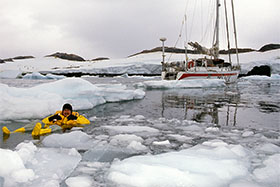Cold Water Survival Time Calculator
You can use this quick and simple cold-water survival time calculator to approximate how long someone can survive in very cold water. This online calculator computes the anticipated survival time using methods that were presented in the Xu & Giesbrecht and Hayward studies. Simply input the temperature of the water and click on the "Calculate" link to generate an estimation of how long a typical person can survive in extremely cold water.
The Impact of Cold Water on the Human Body
 Cold water extracts heat from the surface of the human body 25 times faster than that carried away by air that is of the same temperature. As such, when someone is immersed in cold water, he or she immediately starts to lose critical body heat to the external environment. Initially, the body may attempt to generate its own heat by shivering. However, this is insufficient to counteract the heat that is lost in the water. Depending on the temperature of the water, within 20-30 minutes of being immersed in cold water, the core temperature of the human body will fall below 35°C (95°F). At this point, judgment and cognitive functioning will start to fail. The individual who has been exposed to cold water will become increasingly disorientated, will fall unconscious, and will eventually die.
Cold water extracts heat from the surface of the human body 25 times faster than that carried away by air that is of the same temperature. As such, when someone is immersed in cold water, he or she immediately starts to lose critical body heat to the external environment. Initially, the body may attempt to generate its own heat by shivering. However, this is insufficient to counteract the heat that is lost in the water. Depending on the temperature of the water, within 20-30 minutes of being immersed in cold water, the core temperature of the human body will fall below 35°C (95°F). At this point, judgment and cognitive functioning will start to fail. The individual who has been exposed to cold water will become increasingly disorientated, will fall unconscious, and will eventually die.
The way in which a person responds to being immersed in cold water will vary according to a range of variables, including the amount of body fat, fitness levels, and clothing. However, regardless of these factors, over time, the core body temperature will continue to fall until the point at which the person is removed from the cold water. A variety of books and online resources present graphs that contain details of the amount of time human beings can be expected to survive in water of a variety of temperatures.
| Expected Survival Time in Cold Water | ||
|---|---|---|
| Water Temperature | Exhaustion or Unconsciousness | Expected Survival Time |
| >80°F (>26.7°C) | indefinite | indefinite |
| 70–80°F (21–27°C) | 3–12 hours | 3 hours – indefinite |
| 60–70°F (16–21°C) | 2–7 hours | 2–40 hours |
| 50–60°F (10–16°C) | 1–2 hours | 1–6 hours |
| 40–50°F (4–10°C) | 30–60 minutes | 1–3 hours |
| 32.5–40°F (0–4°C) | 15–30 minutes | 30–90 minutes |
| <32°F (<0°C) | under 15 minutes | under 15–45 minutes |
While these tables can be useful when attempting to predict the maximum amount of time a human being can survive in cold water, there are many stories of people surviving cold water immersion that far extend the limits outlined above. It is important to note that this data simply represents the mean survival temperatures. Some people will survive for longer; others may succumb in a shorter period of time. Furthermore, other factors can impact the outcome.
Our calculator is based on two mathematical models that were specifically developed to forecast survival times. The first was developed by Hayward et al. (1975), while the second was proposed much later by Xu & Giesbrecht (2018).
Hayward et al. performed a series of exposure experiments through which they tested what would happen in a range of situations in which human subjects were immersed in the sea. The research participants consisted of people of an average build who wear wearing light clothing and a lifejacket. The predicted survival duration was calculated according to the assumption that the average person would lose consciousness when his or her core body temperature reached 30°C core temperature.
According to their observations, they estimated the survival durations using Equation 1:
Survival Time (minutes) = 15 + 7.2 / (0.0785 − (0.0034 × water temperature in °C)) (1)
Xu & Giesbrecht (2018) based their proposed calculation of 122 cases reported in the UK National Immersion Incident Survey. Using this data, they presented Equation 2 as a means of estimating survival time in cold water.
Survival Time (hours) = 0.0547 × (water temperature in °C)2 + 0.5048 × (water temperature in °C) + 1.3604 (2)
The calculation of survival time employed in this online calculator varies according to the water temperature in which the person is submerged. If the temperature is greater than zero, Equation 1 is applied. If the temperature is zero or below, Equation 2 is applied.
